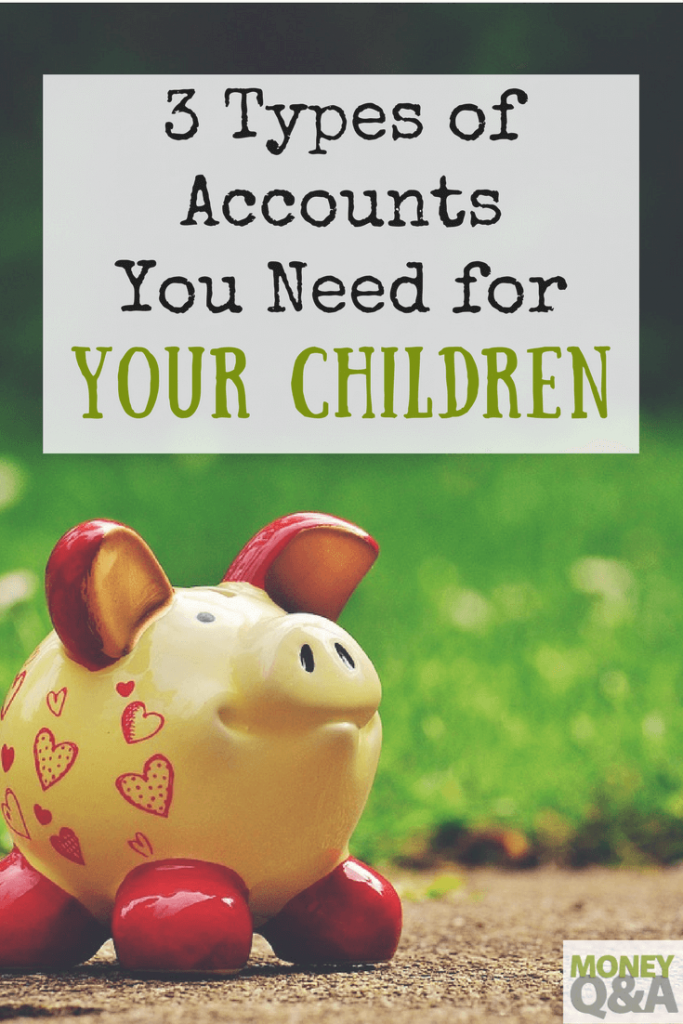One of the most important things that you have to consider is what your goals are for the money you are saving for your children.
Do you want to have more money for them to go to college with? Do you want to be able to help them buy them a car when they are 16 years-old? Do you want to save for your daughter’s wedding?
The goal will drive which investment choice that you make. Here are three options for you to consider based on your goals.
Three Accounts To Invest For Your Children
529 College Savings Account

The parent can withdraw the money and earnings tax free as long as they are used for a qualified educational expense. Additionally, with a 529 College Savings Account, the parent retains control over the account. So, if your child decides to skip college, you can transfer the account to another beneficiary.
Roth IRA
If your children have an earned income, then they are allowed to own a Roth IRA. The best thing that young investors have is time on their side.
A college graduate who maximizes his or her Roth IRA contributions from age 22 until retirement at 65 can see his nest egg grow to over $1.6 million dollars by the time he retires. If his parents had started a Roth IRA for him when he was cutting grass for the neighbors back in middle and high school at age 12 and then he continued the contributions through age 65, his nest egg would have been a staggering $3.6 million.
And, these figures do not even include the extra $1,000 catch up contribution that he is allowed to make starting at 50 years-old.
Open a No-Fee Motif IRA and get $150 with a qualifying transfer.
Taxable Index Funds & ETFs
My children receive money all the time for their birthdays and for the Christmas holidays. My wife has put this money in a simple online savings account for years and has only recently decided that she wants to invest it and earn a larger rate of return than an online savings account like the Electric Orange from ING Direct or from certificates of deposit.
So, another option is to open a taxable mutual funds or exchange traded funds (ETFs). We ended opening an account for our children with Betterment which is a fairly new investment company that has a portfolio of ETFs and an awesome website where you can monitor your investment and set goals for your accounts. Be sure to check out my full review of Betterment.
There are many options that parents have when deciding where to invest for your children. While there are often certain restrictions to investing for your children, they will be well rewarded later in life and in retirement for your hard work now.
Do not let your children’s savings squander in a simple savings account if you do not need the money for decades. Finding out where to invest for your children can wind up being the difference between hundreds of thousands of dollars in their nest egg in the end.


I don’t have children yet but, my wife and I have decided to use a taxable investment account for child expenses. We don’t qualify for an IRA and we didn’t like the 10% fee that comes with not using the 529 funds for qualified educational expenses. Also, there is often less flexibility with the 529 plan and how you can invest.
You are right about flexiblity. If you want to be able to use the account for anything that you wish, then a 529 College Savings Plan is not the answer you are looking for. The one benefit of a 529 College Savings Plan is its tax free use for education. With flexiblity comes more taxes but also more options.
Hank-
The parents opening a Roth for their 12-yr old (minor) would be an interesting post in itself. The income is supposed to be “taxable” but they don’t necessarily have to pay tax on it. Example: if a child (age 16) earned 2k bagging groceries, they (most likely) wouldn’t pay tax on this, but could use it fund a Roth IRA. So if the employer is now a parent or neighbor, how closely would the IRS look into this? Getting paid for a chore hardly seems like a taxable event, but the IRS may let it slide…
funancials,
I’ve written about that before. You have to keep good records when you have a minor open a Roth IRA or if you open one for the minor with respect to the income they earned. Remember, they can only invest $5,000 each year in a Roth IRA or their total earned income, whichever is less for the year.
I too don’t have children yet but we definitely plan on utilizing options like these when they do come along. We live in Canada so the options available are a bit different but the principle is the same- give your kids a head start. Thanks for the information.
Not that I am an expert, but I believe there are multiple tax and scholarship eligibility impacts from investing in a child’s name that should be reviewed with the appropriately trained professional.
Marie,
You are absolutely right. 529 College Savings Plans should be held in the parent’s name with the child as a beneficiary for taxes, scholarship opprotunities, and transferablity.
We don’t have kids, but we are debating opening a 529 in my husband’s name and a ROTH IRA in our name. Both of them for the purpose of their education. Right now along with our 401k, we don’t have enough to contribute to a ROTH IRA, so if we open one it would be for the purpose of education for the (future) kid(s).
Great article Hank. Our three kids are all under age 10, so we only have a 529 account established for each of them currently. As their personal assets accumulate I will be encouraging them to seek higher returns, as you suggest. Investing is a learning experience and if they can learn some valuable lessons without risking too much they will be better prepared to manage as they mature.
Hank,
Which one is safest of principal & earnings?
The 529… is that insured like a traditional savings account? I am assuming the taxable index funds are not ?